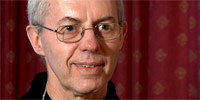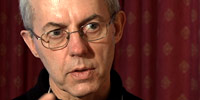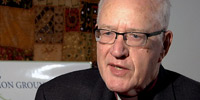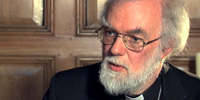In This Episode << SLIDE LEFT TO SEE ADDITIONAL SEGMENTS
Lambeth Preview
BOB ABERNETHY, anchor: Six-hundred-and-fifty bishops of the worldwide Anglican Communion assembled in Canterbury, England this week for the Lambeth Conference, a three-week-long meeting that’s held just once every decade. But more than 200 other bishops are boycotting the event. The 77-million-member Communion has been threatened with schism because of longstanding divisions over homosexuality and the interpretation of Scripture. But organizers acknowledge that this Lambeth conference is not likely to end the crisis.
The Episcopal Church is the U.S. branch of the Anglican Communion, and parishes here continue to wrestle with the issues on the table at Lambeth. Kim Lawton has our look at three very distinct congregations.
KIM LAWTON: Anglicans have been a contentious crowd since the tradition was founded under King Henry VIII nearly 500 years ago. Anglicanism has long stressed unity in the midst of diversity. But now, diversity may be stretching the Anglican Communion to a breaking point.
At one end of the spectrum is All Saints Episcopal Church in Pasadena, California, which has been at the forefront of advocacy for more inclusion of gays and lesbians.
Reverend ED BACON (All Saints Episcopal Church, at wedding): Dearly beloved, we are gathered together by the grace of God …

Ed Bacon |
LAWTON: When California legalized gay marriage earlier this year, congregational leaders at All Saints immediately voted to offer the rite of marriage to same-sex couples.
Rev. BACON: We believe that God’s love is not discriminatory. It’s not bigoted. There are no second class citizens, and so the graces of the church should extend to everyone, regardless of who they are.
(at wedding): If any of you can show just cause why they may not lawfully be married, speak now or else forever hold your peace.
LAWTON: Many Anglican churches around the world, especially in Africa, Asia and South America, are strongly opposed to gay rights. The last Lambeth Conference in 1998 approved a resolution asserting that homosexual practice is “incompatible with Scripture.” International Anglican leaders had asked the U.S. Episcopal Church to exercise caution in moving ahead with gay issues. But Bacon says as a priest he must minister to the people in his pews.
Rev. BACON: By the authority of the Holy Spirit, and the state of California I pronounce that you are married.
So we have a responsibility here on the ground, at the grassroots level to move forward with justice, inclusion, love and compassion. And the bishops can talk about it, but we think the bishops will come around and see that we are exercising great pastoral responsibility.

Gene Robinson |
LAWTON: All Saints also actively supports Gene Robinson, the first openly gay bishop in the Episcopal Church. Robinson’s 2003 consecration in the Diocese of New Hampshire set off a firestorm of controversy across the global Communion. Because of the turmoil, Archbishop of Canterbury Rowan Williams, the spiritual head of the Communion, asked Robinson not to attend the Lambeth meeting. But Robinson has gone to Canterbury anyway to advocate for gay issues outside the official meeting.
Bishop GENE ROBINSON (Diocese of New Hampshire): I go with a greater sense of focus on gay and lesbian, bisexual and transgender people around the world. In an odd sort of way, not being included in the official meetings gives me that greater opportunity to focus on that.
Rev. BACON: The entire New Testament is about inclusion, about bringing more and more people in and understanding that there’s nothing God created which is inherently evil. And so the Bible itself moves toward inclusion.
LAWTON: But at St. Peter’s Anglican Church in Tallahassee, Florida, Reverend Eric Dudley reads the Bible very differently. Dudley had been rector at nearby St. John’s Episcopal Church for 10 years, but was upset at what he saw as the increasingly liberal theological direction of the national denomination, especially on gay issues.
Reverend ERIC DUDLEY (St. Peter’s Anglican Church): When we moved to the place that it was no longer the occasional priest, bishop here or there, but it became the official stance of the Church itself under whose umbrella I stand as a priest, then I couldn’t do it anymore.
LAWTON: In 2005, Dudley announced he was leaving the Episcopal Church to start a new Anglican congregation. Rather than launching a lawsuit to keep the historic building, Dudley acquired an unused church building from another denomination. On the first Sunday, 800 people showed up. St. Peter’s still averages about 650 people every week and gets the help of local police for traffic and crowd control. They have numerous thriving programs, such as Vacation Bible School.

Eric Dudley |
Rev. DUDLEY: I’d much rather pour my energies out into building some strong new church that’s still faithful to Anglicanism, but that’s strongly unapologetically orthodox. A church where I don’t have to be continually fighting battles for things that I think should be givens.
LAWTON: Because Dudley wanted to stay within the Anglican Communion, he placed St. Peter’s under the authority of the Anglican Church of Uganda.
Rev. DUDLEY: I think it’s wonderfully ironic that you’ve got a bunch of wealthy, white mostly, Americans who’ve found their salvation, so to speak, in a bunch of poor Africans. I mean, you know God smiles at that.
LAWTON: The Episcopal Church sees the Ugandan role as an unethical incursion into its jurisdiction. St. Peter’s bishop is John Guernsey, an American who was consecrated as a bishop for the Anglican Church of Uganda.
Archbishop HENRY OROMBI (Anglican Church of Uganda): John Guernsey has been duly consecrated as a bishop.
LAWTON: Guernsey and other American bishops for African churches have also been excluded from Lambeth, just like Gene Robinson. Uganda’s Archbishop Henry Orombi and more than 200 other conservative bishops are boycotting Lambeth. They held their own gathering in Jerusalem last month and called for a new North American church body that would officially be part of the Anglican Communion, but would not be affiliated with the Episcopal Church.
Rev. DUDLEY: They’re seeking to create a fellowship of confessing Anglicans, that is, those who want to be clear in their commitments to orthodox faith.
Reverend SAMUEL COLLEY-TOOTHAKER: My brothers and sisters, the Lord be with you
CONGREGATION: And also with you.
Rev. COLLEY-TOOTHAKER: Let us pray.
LAWTON: In Danville, Virginia, leaders at the Episcopal Church of the Epiphany say they’ve been trying hard not to let church battles interfere with their local ministry.

Samuel Colley-Toothaker |
Rev. COLLEY-TOOTHAKER: My personal opinions about the theological matters which are currently plaguing the Episcopal Church really are not so much of import if I keep my eye on the ball, which is to lead this congregation in the work that Christ is calling us to.
LAWTON: Epiphany has been in Danville since the 1800s and claims that Confederate leader Jefferson Davis is among those who’ve worshipped there. The church has struggled to maintain a strong Episcopal witness in a community hard hit by the demise of tobacco and textile industries.
Reverend COLLEY-TOOTHAKER: Mission is actually doing the work that Christ gives us to do. Because the parish is endowed and has resources, we would be able to establish an Episcopal school that is not geared solely to those privileged few who can afford the tuition. And nobody will be priced out of the education that we’re able to give here.
LAWTON: Although many mainline churches have been losing members, Epiphany has been growing.
Rev. COLLEY-TOOTHAKER: We decided that if we were going to be able to grow this church and continue to preach the Gospel of Jesus Christ, then we needed to get people into the door however we could get them through the door.
LAWTON: The pastor says many members deeply value Anglicanism’s balance between Catholicism and Protestantism.
Rev. COLLEY-TOOTHAKER: We really do try to find the middle way in that we really are a bridge between the Roman tradition and sort of the more evangelical reform tradition.
LAWTON: The congregation tries to accommodate all people, including gays and lesbians. But Colley-Toothaker admits there might be some limits.
Rev. COLLEY-TOOTHAKER: If the Episcopal Church of the United States decided that it was going to tell us that we needed to begin to bless same sex unions using the sacrament of marriage that might be a line that I would draw in the sand.

Canterbury Cathedral |
LAWTON: Anglicans around the world hope the bishops meeting under the shadow of Canterbury’s historic cathedral will find a way to hold all these disparate points of view together. But the structure of this year’s Lambeth conference makes decisive solutions unlikely.
Bishop KATHARINE JEFFERTS SCHORI (Episcopal Presiding Bishop at press conference): It’s a global conversation. It’s not going to legislate. It’s not going to make final decisions about anything.
LAWTON: Still, even as they move forward with their own local ministries, U.S. churches recognize those Lambeth conversations could have important implications for their futures.
Rev. BACON: My message for the bishops who are meeting in Lambeth is to open the depths of their being to the movement of the Holy Spirit that leads them into all truth, and then to have the courage of the convictions that come from listening to the Holy Spirit.
Rev. DUDLEY: The overwhelming majority of Anglicans stand where I do on these issues. Go back and look through the last several hundred years of Anglicanism and where we stand is where they stood.
Rev. COLLEY-TOOTHAKER: Throughout the history of the hurch we have always found something to fight about, and those fights generally become so raucous that they lead to schism. I believe that is not in keeping in the teaching and the modeling of ministry of Jesus Christ himself gave to us.
LAWTON: The question for the bishops at Lambeth is whether it is still possible to hold all that diversity together.
I’m Kim LAWTON reporting.






